Types of Puppy Vaccinations and When to Get Them
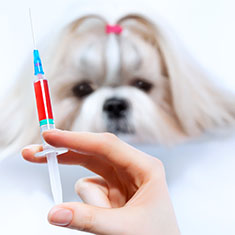
When your new puppy arrives into your loving care, the first and foremost thing you should do is to contact your local vet and arrange a vaccination. The veterinarian should then be able to divulge some information regarding each particular shot and the properties of each one. There are numerous types of vaccinations to gain some knowledge on, and each one is required for a different reason. Due to puppies and dogs being curious creatures, it is inevitable for them to explore the world they live in and come in close contact with dangerous bacterial infections. With a simple vaccination, the harmful effects of these infections can be eliminated.
Doggies.com is not soliciting any veterinary advice and this article is for informational purposes only. Always discuss your individual puppy’s needs with your veterinarian.
DHHP and Deworming Vaccines
At the mere age of 6-7 weeks old, your puppy will require its first DHPP, which protects from (D) distemper, (H) hepatitis, (P) parainfluenza and (P) parvovirus. As well as this, your puppy will have its first de-worming vaccination to prevent from dog worm. This vaccination is relatively quick and although your puppy may be slightly uncomfortable in the process, no harm will be done to the animal. Your puppy will continue to receive a second stage of the DHPP vaccination at the age of 9-10 weeks old.
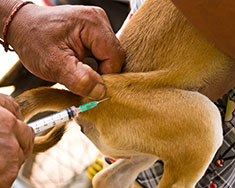
Much like the first vaccination, another de-worming procedure will take place followed by a third DHLPP vaccination at 12-13 weeks of age. This will be a vaccination and a faecal examination on the puppy, in which the faeces of the animal will be microscopically examined. This will demonstrate whether or not there are any prominent problems such as gastrointestinal parasites, abnormal parasites, roundworms, hookworms, whipworms, coccidian worms and tapeworms.
Bordetella Vaccine
Following this, at the same age, the puppy will need a bordetella vaccination to shield from kennel cough and breakouts of infection. Kennel cough has the scientific term bordetella bronchiseptica, and it is a viral infection that is airborne. For an animal that will be in close quarters or around other animals frequently, this is very beneficial to protecting their health. This vaccination is normally grouped together with other vaccinations that follow, until the dog is completely immune.
The bordetella vaccination will consist of a nasal method, where drops of the vaccine will enter their nose. This is to prevent the infection from occurring in the place where it would begin to administer. Although this is the most common method for the vaccination, some puppies will not be as easy to vaccinate. In this case, a shot would be given and would continue as a booster until the dog is entirely immune. Some side effects may occur from the bordetella vaccination including immediate sneezing after the drops of vaccination enter the nasal passage of the puppy. If the puppy has the vaccination shot method, there may be some swelling, soreness or irritation around the area.
Spaying or Neutering
Once your pet puppy reaches the age of 4 months old, spay or neuter surgery will be necessary. This is to prevent the animal from reproducing and will consist of removing all or part of the reproductive organs. Spay surgery will be required for a female puppy, whereas a male puppy will have the neuter surgery. Canine spay will consist of removing the ovaries and uterus from the animal. A surgery will be performed by a highly skilled professional and some side effects may occur such as an abnormal reaction to the anaesthesia, bleeding, infections or stitches breaking and coming out. This can be relatively painful for the animal but will heal in time.
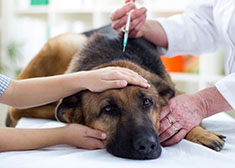
Canine neutering will consist of removing the testicles and organs which house sperm development. The chord that attaches the testicles to the remainder of the male reproductive organs is removed partially. Generally, this form of surgery is considerably quicker than that of a canine spay, but it also comes with some complications. Some of the complications and side effects include bleeding following surgery (the dog will be monitored for blood loss). Rarely, internal bleeding may occur and sometimes there is the possibility of infection where the incision was made.
Rabies Vaccine
Another vaccination a puppy will need at 4 months of age is a rabies vaccination. This is to prevent from the rabies disease and it is vital for your dog’s health and wellbeing. This viral infection is normally acquired in humans as a result from a dog bite. This form of vaccination is relatively straightforward and it is needed annually. Incredibly effective, the rabies vaccination will protect from rabies disease spreading and causing fatalities among humans. Possible allergic reactions to the rabies vaccination include some redness and swelling at the site of injection for a few days following the shot, as well as possible nausea, muscle aches and fever.
Blood Tests
Two months after the rabies vaccination, a heartworm test is necessary. The reason for this test is to ensure there is no evidence of a parasite called dirofilaria immitis present in the bloodstream. Commonly known as heartworm, a blood sample will be taken from the animal and mixed with a specific chemical to then be examined under a microscope for the presence of microfilaria, which are worms in the blood.
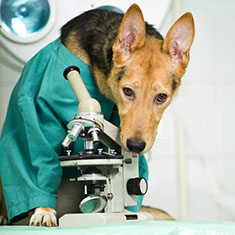
Another test known as the serology test will consist of more blood being taken and placed on a heartworm test filter paper. Working much like a home pregnancy test, the fluid will spread across the paper displaying a colour change or a faint line developing if the result is positive. No major side effects arise from this test, but there may be some soreness or swelling where the needle is inserted into the animal’s skin. Following the heartworm test, a heartworm preventative will be required in monthly cycles to completely prevent from any problems occurring. Heartworm prevention is essential to a long and happy life for a canine.
Annual Booster Shots
There are some annual vaccinations that your pet dog will need in order to stay at a desirable health. These include a DHLPP booster, a rabies booster, a bordetella booster and an internal and external parasites exam. The DHLPP booster vaccine protects from (D) distemper, (H) hepatitis, (L) leptospirosis, (P) parvovirus and (P) parainfluenza. The vaccination is needed for a number of reasons, all of which lie in the name of the booster. The vaccination helps to prevent from some fatal diseases such as distemper, which is a viral disease that is highly contagious and can affect an animal’s main organs. The eyes, brain, skin, intestinal and respiratory tracts of dogs are at risk with this disease. The vaccination can significantly reduce the widespread problems of this viral infection being so contagious.
Canine hepatitis is extremely infectious and can be prevented through routine DHLPP booster vaccinations. Affecting the liver and corneas of dogs, it is important to get the DHLPP booster vaccination to keep your dog immune from such things. Leptospirosis, parvovirus and canine parainfluenza are three other types of disease that are protected from through this booster vaccination. With annual DHLPP booster vaccinations, your dog can be completely protected from these life threatening problems. As with all vaccinations, there may be some soreness or swelling for a few days after the shot has been given to an animal.
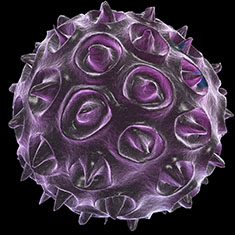
The rabies booster is of course an annual vaccination that is needed to keep your pet dog immune from the rabies disease. At 4 months of age your pet dog should have already received a rabies vaccination, but the rabies booster vaccination is equally as important as the first. Each year, your dog must get more doses of this vaccination in order to stay healthy and without risk of contracting the disease.
The bordetella booster is another annual booster to avoid the risks of getting kennel cough. Much like the rabies booster, your pet dog should have had this vaccination at an earlier age. Annual vaccinations will be a form of added protection to your dog’s immunity of the disease. Keeping on top of annual vaccinations will thoroughly protect your dog.
What about Parasites?
An internal and external parasites exam is something every dog will go through on an annual basis. The reason for this exam is to make sure there are no parasites active and feeding on or inside your animal. These parasites gain nourishment from animals like dogs and come in the form of various worms, fleas, ticks, mites and lice. An examination will be performed to see if there are any external parasites on your dog’s skin and fur. As well as this, an internal examination will be performed, which usually consists of inspecting a dogs stool for parasites. If any problems are found, treatment will be given accordingly. With dogs being vulnerable to all types of parasites, it is important you take your dog for annual internal and external parasites examinations.
The final thing you should be aware of when having a puppy as a pet is the risk of fleas and ticks. These are very common among dogs and sometimes inevitable, which is why flea and tick treatment is needed monthly to immunize your dog from getting these types of parasite. Certain living conditions, outdoor conditions or being in close proximity to other dogs and animals can cause fleas and ticks to occur. It is vital to get this treatment monthly to prevent your dog from uncomfortable itches or bites.
It can be a burdensome task to stay on top of the types of vaccinations and treatments that are required for puppies and dogs. However, without ensuring to regularly treat your dog, you may be facing more difficult circumstances. Keep a log or diary detailing the dates these vaccinations are required, and request letters from your chosen vet when the dates are approaching to avoid missing any appointments.
Doggies Den: Latest Articles
 Homemade Thanksgiving Treats for Your Dog
Homemade Thanksgiving Treats for Your Dog
NUTRITION We all want to include our dogs in our holiday celebrations, but hopefully, you're aware that sharing table scraps with your dog isn't always the best idea.
 Keeping Your Dog Safe during the Summer Months
Keeping Your Dog Safe during the Summer Months
HEALTH Summer is coming on fast, so it’s time to plan how you will keep your dog safe and healthy through the lazy, carefree, warm days.
 Vaccination Time Again-Keeping Your Puppy Healthy
Vaccination Time Again-Keeping Your Puppy Healthy
DOG HEALTH So you have your new puppy picked out. There are quite a few shots, treatments and examinations that will keep the newest member of your family healthy.
 Canine Thanksgiving Feast
Canine Thanksgiving Feast
NUTRITION With the wide variety of food at Thanksgiving dinner, chances are you'll want to give your dog something special, too. If you're contemplating what to feed your dog for the holiday, here is a guide to a great Canine Thanksgiving Feast.
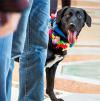 Dog Walking Tips Every Owner Should Know
Dog Walking Tips Every Owner Should Know
DOG FUN Walking your dog is not only crucial to keeping him healthy and happy, it strengthens the bond between your canine friend and his caregiver. There are a lot of obstacles out there. Don’t forget these simple tips to keep your walk fun and safe in the outside world.
 The Benefits of Physiotherapy for your Dog
The Benefits of Physiotherapy for your Dog
HEALTH The same techniques that physiotherapists use to treat a variety of injuries and conditions in humans have been adapted to suit animals with great success. Family pets, show dogs, and working dogs can all benefit greatly from physiotherapy. Dogs whose activities involve a lot of agility are especially susceptible to the types of problems that physiotherapy can address.
 The Decision- Adding a Dog to Your Family
The Decision- Adding a Dog to Your Family
FIRST TIME OWNERSBringing a dog into your family is a decision where many people don’t realize it’s magnitude until after they have the dog. There are a number of things that you need to research before you decide to purchase a dog, and it starts right in your own home.
 Bringing Your Dog Into Your New Baby's Life
Bringing Your Dog Into Your New Baby's Life
HEALTH Many believe that a dog and a new baby cannot happily coexist, so therefore the dog has to go. This is not necessarily the case.  A new baby does not mean you have to abandon your dog.

Doggies Den:
Most Popular Articles

Dog Pregnancy Symptoms
HEALTHIf you suspect your dog might be pregnant, check out part one in this series on pregnant dogs, where we cover pregnant dog symptoms.
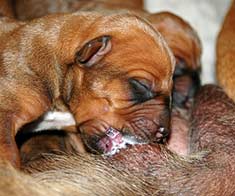
Dog Birth
HEALTHIn the third article of our dog pregnancy series, we look at the wonderful, but messy, process of bringing newborn puppies into the world.
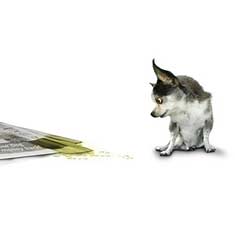
Indoor Dog Potties
DOG PRODUCTSIt's been a long day at work. You were so busy, you didn't even take time to eat a sandwich, let alone run home to let your dog out. You're on your way home, knowing the poor dog is crossing his or her legs by now, when your car breaks down, delaying you even further. Can't somebody make this easier?
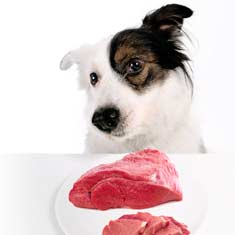
Your Dog’s Digestive System
PHYSIOLOGYEver wonder why your dog eats so fast? Or why he eats gross things? Or why he gets sick to his stomach? Or why his waste stinks so bad? Some of these things are normal, some are not.

Canine Respiratory System
BREATHINGThe basic function of your dog's respiratory system is to bring oxygen in to and remove carbon dioxide from the body. Knowing the symptoms of respiratory diseases can help you help your stay healthy.
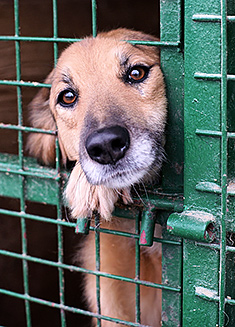
Shelter Dog Adoption Tips for Success
ADOPTION Are you intimidated by the prospect of "rescuing" a dog from a shelter? One reason that you may be wary of adopting a dog from a shelter is not knowing how to choose. Adopting a dog from a shelter can be a rewarding process, if you're prepared to do a reasonable amount of research.
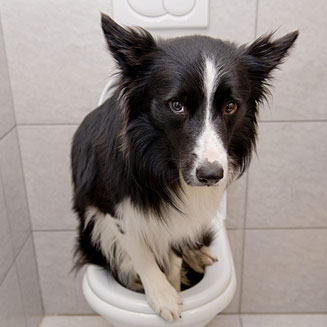
Canine Urinary Tract Infections
SYMPTOMS AND TREATMENTDoes your dog seem to be having trouble relieving his or her bladder? Learn how to recognize the signs of urinary tract infections and how to treat them before they spread.
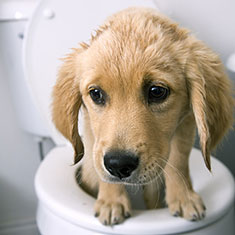
What to do for Dog Diarrhea
SYMPTOMS AND REMEDIESIf you have dogs in your house for any length of time, you have likely experienced at least one bout of dog diarrhea. Beyond the pain in the tuckus involved in cleaning up the mess, you should know what causes diarrhea, and when it's important to see the vet.

What to do for a Dog Bite
DOG BEHAVIOR Getting bitten by a dog can be scary, and you may be tempted to run around in circles for a while, trying to figure out what to do. Here's our guide to help you manage the situation.
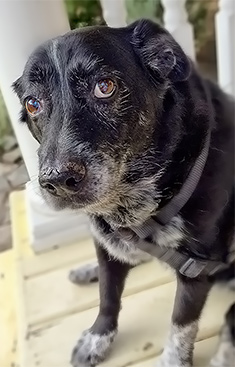
Top Ten Tips for Living with a Senior Dog
DOG HEALTH Bringing home a new puppy is so exciting, but it doesn’t take all that long for your exuberant puppy to grow into a senior dog who may have special needs. Here are the doggies.com top ten tips for taking care of your companion who has been with you through so much.
